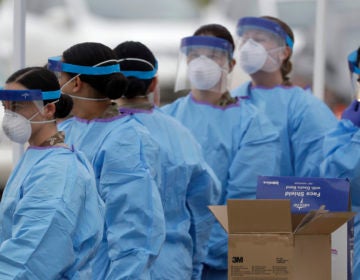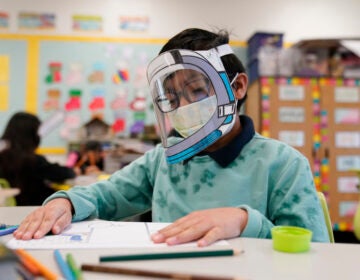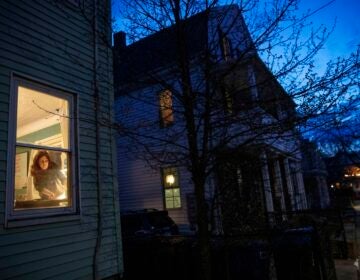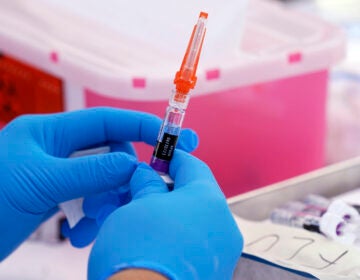Pa. coronavirus recovery: Philly warns restaurants to follow outdoor dining guidelines or risk shutdown
Despite encouraging numbers, the city is warning restaurants that if they fail to follow rules for outdoor dining, they could face shutdowns.

Lynn Tanner, center, and her husband Ryan, bottom right, are served lunch at Busy Bee Cafe Thursday, May 21, 2020, in Ventura, Calif. Much of the country remains unlikely to venture out to bars, restaurants, theaters or gyms anytime soon, despite state and local officials increasingly allowing businesses to reopen. That's according to a new survey by The Associated Press-NORC Center for Public Affairs Research. (AP Photo/Marcio Jose Sanchez)
Are you on the front lines of the coronavirus? Help us report on the pandemic.
As of June 15, there were 79,121 positive cases of COVID-19 in Pennsylvania and 6,243 total deaths attributed to the virus. Most hospitalizations and deaths have occurred in patients 65 and older. There have been no pediatric deaths to date.
Farley warns restaurants to follow outdoor dining guidelines or risk shutdown
Despite encouraging numbers, the city is warning restaurants that if they fail to follow rules for outdoor dining, they could face shutdowns.
“I understand that restaurants have been hit very hard with this crisis, and the city wants to help those restaurants,” Philadelphia Health Commissioner Tom Farley said on Tuesday. “But what I saw — what I heard — has me very concerned.”
Philadelphia reopened outdoor dining on Friday, June 12, as part of Pennsylvania’s shift into the yellow phase of the state’s reopening plan.
Farley cited reports of people failing to wear masks, and customers seated at tables less than six feet apart from each other, in violation of guidance issued to restaurants.
“I want to be clear to everyone — this epidemic isn’t over, far from it,” Farley said. “Until we have a vaccine, the only thing protecting us is how we behave. So we will be enforcing the rules for these restaurants that have outdoor dining. We will have our sanitarians visit those restaurants and issue warnings. If the restaurants refuse to follow the rules, we will cease the operations of those restaurants.”
Farley also urged customers to help enforce social distancing rules by refusing to patronize non-compliant restaurants, and to report them to the city by calling 311.
He added that the city’s safe reopening depends on everyone continuing to follow reopening guidelines as they venture more outside their homes, adding that the rules for individuals are pretty simple: masks, distance, and hand-washing.
“I’m pleading with people to take these guidelines seriously,” Farley said. “If they don’t — and we can’t control it all — we will see another epidemic wave and we will see many more deaths.”
Protests do not seem to have caused a COVID-19 uptick in Philly
Philadelphia marked 116 new confirmed cases of COVID-19 on Tuesday, bringing the city’s total to 24,591.
“That number of new cases, divided by the number of tests received, means that less than 6% were positive, and that’s at an all-time low,” said Philadelphia Health Commissioner Tom Farley. “So the fact that that number is above 100 really is more reflective of the fact we’re doing more testing.”
The death toll rose by 21 from the previous day, to a total of 1,495. (The state noted that today’s number is higher than usual due to periodic matching with state databases, which helps identify additional deaths that were previously not reported as COVID-related.) Of the 1,495 deaths, 768 (51%) were long-term care facility residents.
The numbers come as a welcome surprise following fears that recent protests could cause new cases of COVID-19 to spike.
“So far, there’s no evidence of increased spread as a result of the protests,” Farley said. “And that’s a very good thing.”
The city has continued expanding testing in recent days, and is now recommending tests for anyone with respiratory symptoms, or who believes they’ve been exposed to COVID-19. You can find your nearest testing site here.
Pa. Health Dept. warns Lyme disease, COVID share symptoms
Pennsylvanians should beware of another dangerous illness that shares symptoms with COVID-19, Secretary of Health Dr. Rachel Levine warned Tuesday — Lyme disease.
“Over the past several months, we have seen an increase in the number of emergency department visits related to tick bites,” Levine said. “Some symptoms of Lyme disease, such as fever, chills and headache, are similar to symptoms of COVID-19.”
Lyme disease is a bacterial infection that’s typically transmitted to humans through tick bites. When caught early, it can be treated using antibiotics. But when left untreated, the disease can spread, leading to severe symptoms that may affect the heart, nervous system and joints.
Pennsylvania leads the country in Lyme disease cases, and in recent decades has shown a spike in blacklegged ticks, the species most responsible for spreading the illness.
The Department of Health has tallied 8,500 cases of Lyme disease throughout the state for 2019 so far.
Infection rates typically spike in June and July, when people spend more time outside. Experts typically cite woody and grassy areas as being the most risky, though the Health Department warns that tick bites can happen anytime people are outside, including in their own yards.
The department offers the following safety measures to avoid tick bites:
- Walk in the center of trails and avoid areas with high grass and leaf litter
- Use a repellent that contains at least 20% DEET
- Wear light-colored clothing
- Conduct full-body tick checks on yourself and on your pets after spending time outdoors
- Take a bath or shower within 2 hours after coming indoors.
Potential signs of infection include a red, swollen bulls-eye shaped rash, fever, chills, headache, fatigue, muscle and joint aches, and swollen lymph nodes. Early stage symptoms may appear in as little as two days, or as long as 30 days after exposure. Later-stage symptoms, like arthritis, heart, and neurological issues, may appear months later.
Symptoms shared by both Lyme disease and COVID-19 include fever, cough, shortness of breath, diarrhea, chills, muscle pain, headache, sore throat, and loss of taste or smell.
$40 million to boost PA’s ailing dairy industry and food security
Pennsylvania’s flagging dairy industry and food security programs – both hit hard by the ongoing pandemic – will receive $40 million in funding through the federal Coronavirus Aid, Relief, and Economic Security (CARES) Act, Governor Wolf announced on Tuesday.
Fifteen million is being allocated for direct relief payments, and $5 million to reimburse dairy farmers who’ve donated excess dairy products to the Pennsylvania Agricultural Surplus System (PASS), the state’s charitable food program.
Dairy farms made headlines in recent months after being forced to dump milk, thanks to disruptions in the supply chain that prevented them from getting their product to the market.
Now, the state government says, farmers who experienced financial losses due to discarded or displaced milk can apply for assistance. Farms with documented losses will receive at least $1,500, in addition to a prorated share of the remaining funds. The deadline to apply for the Dairy Indemnity Program is September 30, 2020.
Another $15 million will go to the State Food Purchase Program, which offers cash grants to counties for the purchase and distribution of food to low income individuals.
The remaining $5 million will go to the PASS program to reimburse the agricultural industry for the cost of harvesting, processing, packaging, and transporting food that they donate to the charitable food system.
WHYY is your source for fact-based, in-depth journalism and information. As a nonprofit organization, we rely on financial support from readers like you. Please give today.





![CoronavirusPandemic_1024x512[1]](https://whyy.org/wp-content/uploads/2020/03/CoronavirusPandemic_1024x5121-300x150.jpg)


